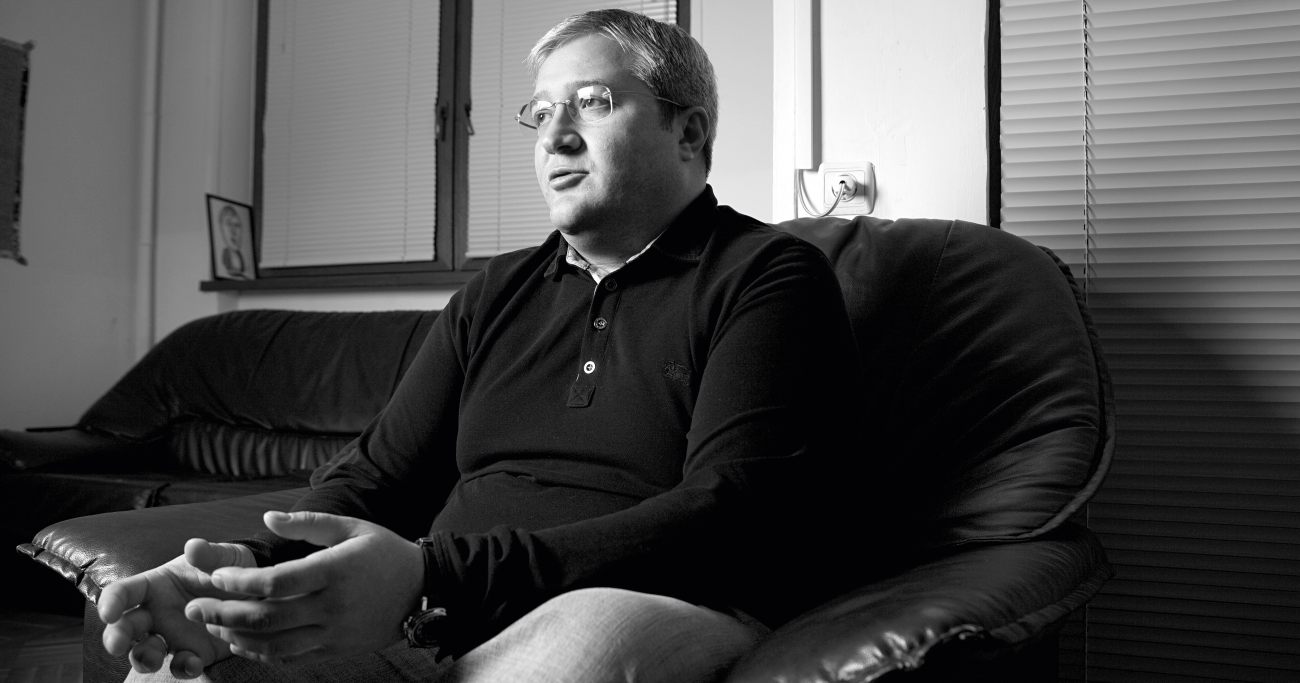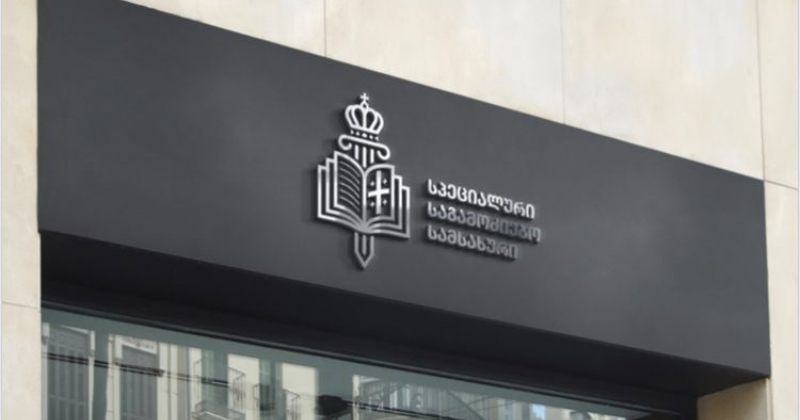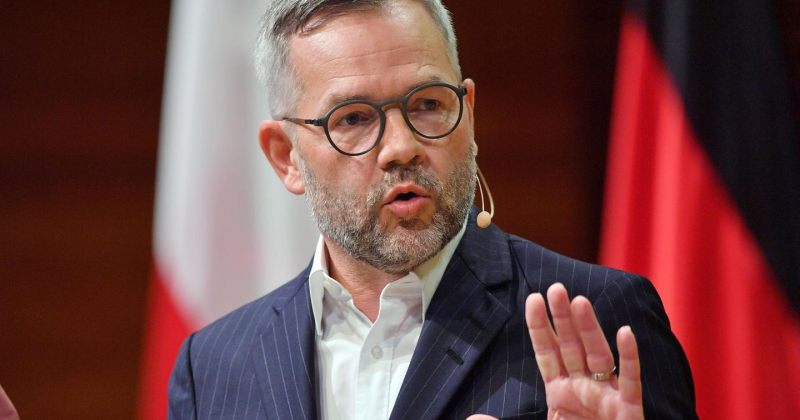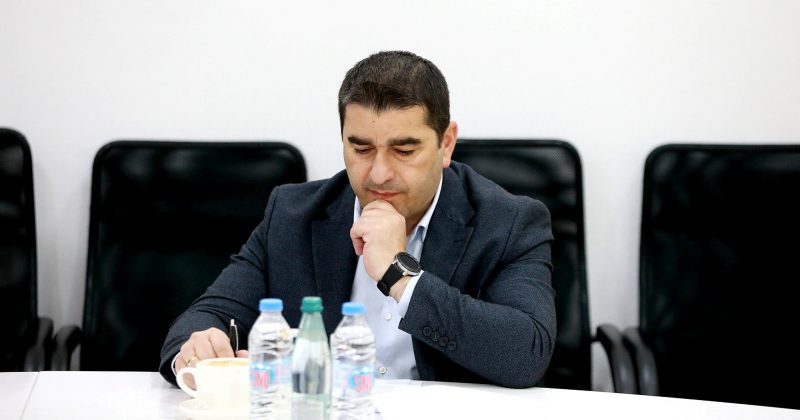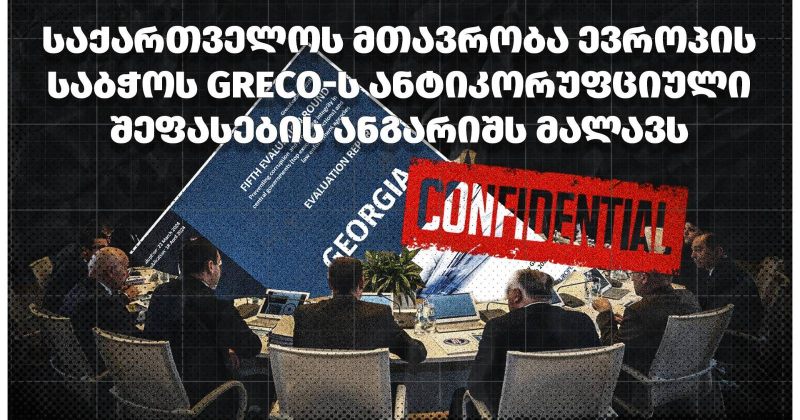Dubbed by the American press as the Che Guevara of the Caucasus, Member of Parliament Givi Targamadze spoke with Tabula about the Ukrainian revolution, unknown details from the biography of President Viktor Yanukovych that reveal his criminal mentality, the leaders of the Maidan protests and resentful Ukrainian oligarchs. He also spoke about the domestic and foreign political mistakes made by the ruling Georgian Dream coalition.
The key topic of this interview is Ukraine. Let's start with President Viktor Yanukovych: in your opinion, what is the situation he now finds himself in?
Yanukovych is frightened; he is in a bad situation. Proof of this is his offering concessions to the political opposition. He is perhaps the first ever president to have never ceded anything before, never retreated by even an inch throughout his rule. In this context, it is important to bear in mind his past life that conditions the manner of his actions.
This person is an ordinary criminal. He is criminal not in the understanding of statehood, but in his criminal mindset. In this regard, Ukraine is also a country of wonder. Such a precedent is very rare.
The history of Yanukovych was the following – there was a Donetsk gang, a Tatarian gang set up by Tatars, which was quite well organized for some 25 years.
Could you please explain what you mean by Tatars? This term is often used incorrectly.
By Tartars I clearly do not mean Azerbaijanis – this is something that is often mistakenly used because the Russian Empire referred to them as such. What I mean is the Turkic ethnic group living in Ukraine since the medieval period. Rinat Akhmetov [a Ukrainian businessman and oligarch] is also of Tatar descent.
That gang was established by a person, also Tatar by ethnic origin, whose underworld nickname was Grek [Greek]. Two Georgians, the Dolidze brothers, who had very close ties with Grek, also participated in establishing that gang. It was between the Dolidze brothers and Rinat Akhemtov, who led one of groups of this gang, that a conflict emerged. Back then, Akhemtov was severely beaten, but not to death. That was perhaps the brothers' mistake because when Akhmetov rehabilitated himself he first killed one of the brothers in Donetsk and then the other brother here, in Tbilisi's central district. Back then, although photos of the second brother's killer were published, the killer escaped arrest.
After that, Akhemtov became Grek's right-hand man, his favorite. Akhmetov ran the entire organization of the gang. Grek and Akhmetov were rarely seen apart, they went almost everywhere together, save for on exceptional occasions. One such occasion was at a football match of Shakhtar Donetsk – during that match the entire tier where Grek was sitting was blown up. That gave rise to suspicions, which were not unfounded, that Akhemtov was behind the assassination of Grek. To help dispel these, Akhmetov staged a long period of mourning and an impressive burial ceremony.
During that very period of mourning, Akhmetov recalled a story that Grek had once told him: while in prison, Grek had had a clash with a crime boss and only escaped death at the hands of that crime boss owing to a young boy. As Akhmetov recalled, it was Grek's request that the boy should be taken care of should anything happened to him, i.e. after his death. That boy appeared to be Viktor Yanukovych. Akhmetov took such good care of him that, at the end of the day, Yanukovych became president.
Yanukovych was first convicted for robbery – he stole hats from people as they entered a toilet. The second conviction involved rape. These are confirmed facts and have been much discussed during his term of service as both president and prime minister. Naturally, they thereafter tried to erase these facts from history, but as far as I am aware, one can still find bits of information here and there in the archives.
Given his past life, Yanukovych's behavior is absolutely understandable. I always maintained that he would necessarily incarcerate [former prime minister] Yulia Tymoshenko: this is his criminal mindset – the winner destroys the loser. Even though Yanukovych did not kill Tymoshenko, he sent her to prison.
After six months of coming to power, Yanukovych started to limit the powers of Rinat Akhmetov and his milieu. One such person from that milieu was [Borys] Kolesnikov, the most influential figure in Donetsk after Akhmetov. By the way, the idea of banning me from entering Ukraine came from Kolesnikov who was the deputy prime minister at that time [from 11 March 2010 to 24 December 2012]. Kolesnikov came under such pressure that he was left with no other option but to find shelter in Moscow.
There is yet another noteworthy element – the Donetsk gang never viewed Yanukovych as one of their circle. For them, the current President of Ukraine is a guy from a village near Yenakiieve [a city in the Donetsk Oblast].
khmetov is a native of Donetsk. Therefore, Yanukovych entrusted the task of running the situation, i.e. of collecting money, of course by applying criminal methods, to his fellow villager Yuriy Yenakievsky [the nickname of MP Yuriy Ivanyushchenko], who lived in Geneva at that time and was already a seasoned crime boss. Yenakievsky returned and took over the management of everything. Akhmetov was thus sidelined.
After Yanukovych strengthened his position, he dumped Yenakievsky as well and gave all the power to his son. Yanukovych's son totally controls the economic and financial segment as well the TV channels.
The same happens here [in Georgia].
What happens here?
[Former Prime Minister of Georgia Bidzina] Ivanishvili has the same mentality. He cannot trust his relatives because his close relatives have always stolen his money; he even used to apply to the prosecutor's office during our [United National Movement's] rule, demanding that his relatives be arrested.
Did you arrest them?
Sometimes we did. Since Ivanishvili did not trust his relatives, he replaced his relatives with the relatives of [Prime Minister of Georgia Irakli] Garibashvili. As a result, we obtained a situation in Georgia that is controlled by Garibashvili's father-in-law, Tamaz Tamazashvili.
How do you know that?
I better not rush and speak about this now. Several months ago I gave a pledge that I would recall my previous profession [as a journalist] and will soon provide society with detailed information about how the clan of Tamazashvili has actually got hold of all segments in Georgia.
We will speak about Georgia a bit later, but before that I want to return to Ukraine. In your opinion, how will the events in Ukraine develop?
It is of crucial importance that the opposition takes the correct actions. I think they managed to emerge unscathed from the situation when Yanukovych offered them a compromise – I mean, the high positions [of prime minister and deputy prime minister]. Yanukovych's offer was well calculated – on the one hand, he gained an argument to say to the West that he was prepared to compromise and, on the other hand, he endangered the opposition.
Had the opposition leaders agreed to this offer, the protesters in the Maidan would have failed to understand the move and would have regarded it as a betrayal. Moreover, Yanukovych would still maintain power – Ukraine is a presidential state. At the same time, Yanukovych's political force holds the majority in the Parliament of Ukraine and, consequently, controls it.
[Ukrainian opposition leader Arseniy] Yatseniuk correctly evaluated this situation – taking over a government in crisis would mean that the opposition leaders would not only shortly be sidelined from government activity, but would end up in prison on corruption or other charges. This was a trap that the opposition did not walk into.
The response was correct as well – the Ukrainian opposition declared that they do not shun responsibility, but seek to assume it on their own terms, not on those put to them by Yanukovych.
Their demands are also correct – first, the abolition of those repressive laws that triggered the violence and then the conduct of early elections this year.
But you still have not talked about the prospects...
It is difficult to say how the conflict will be resolved. I have said before and will repeat again that Ukraine is a unique country in terms of its perception of time. Ukrainians perceive time in a different way. Radical actions are tiresome, but such actions may continue for a long time.
The situation in which Yanukovych now finds himself is risky – he has Berkut [police special forces], but Berkut's possibilities are not indefinite. They are under a tough regime now and, unfortunately, we know from our own experience how quickly special assignment units get tired when performing activities. Berkut's physical abilities are weakened.
Besides, the protest movement has gone beyond Kiev and spread over the regions, which itself is an absolutely correct move. First, because Yanukovych has to redistribute the law enforcement bodies among the regions, and second, because it makes the process dynamic. The lack of dynamics contributed to the radicalization of the protest – now, as the protest has become dynamic, the degree of radicalization is abating.
You have said that had the opposition leaders accepted the offer from Yanukovych to be appointed as the prime minister and deputy prime minister, they would have angered the protesters. I have the impression that it is the protesters that determine the agenda rather than the leaders of opposition themselves. How correct is that impression?
This may be partially explained by the inexperience of the leaders. Had Yulia Tymoshenko been free, events would have unfolded in a different way. However, the situation was somewhat similar during the first revolution [the Orange Revolution] – the people outstripped the leaders in their actions, whilst leaders were left catching up with the unfolding events.
The good thing is that the current leaders are gaining experience as they go.
As you have said, the opposition managed to avoid falling into the trap, what option is Yanukovych left with now?
He is now seeking a solution, weighing up his chances. People are angry. Even though it is true that the Maidan protesters behave in an extremely radical way, it is a fact that there have been casualties among the protesters and not among Berkut forces. What Yanukovych had tried to achieve all that time – to portray things as if the protest wave was oppressing the law enforcement bodies and the government – will no longer work.
Yanukovych also sees full well that at any moment throngs of people may gather to storm government entities – something which Yanukovych is defending with such a zeal in Grushevski Street in Kiev.
Yanukovych needs guarantees now; that's why the decision of the opposition was correct – to turn down his offer, but not stop negotiations.
I think, the greater the protest wave, the more adequate Yanukovych will become.
As I have already said, he confined his power within a very narrow circle. Therefore, he will no longer receive support from Akhmetov, who had previously ensured him with the support of the eastern regions of the country. This can be easily seen. The government failed to mobilize people for an anti-Maidan rally, whilst Akhmetov would have easily been able to have some 10 or 20 thousand supporters for that rally.
That's why I think that the opposition now has to focus on the eastern regions. The situation there has ripened to turn the tide. Akhmetov may not provide support – though there are rumors that he financed the protest movement – but he will not block it. This can be seen from his statements – he speaks about the need to find a peaceful resolution of the conflict.
One can often hear talk about a possible divide of Ukraine...
I am sure that this is a myth. This is something created by those politicians who lacked possibilities and thus manipulated things with this fear – when they were not doing anything they explained their passivity as sparing Ukraine from disintegration. Any Ukrainian – be they from Donetsk or Luhansk – regard themselves as Ukrainians. They are merely Eastern Ukrainians who fear natives of Lviv or do not like natives of Kiev, but they are still Ukrainians, not Russians.
Why do they fear natives of Lviv?
Their opinions about the independence of Ukraine and, especially, independence from Russia are so strong and radical that the population of the eastern regions cannot understand them. Western Ukraine was brought up on different traditions.
There are people in Western Ukraine, who are well armed and view the idea of a war against Russia as something sacred. They have experience of such a fight – the last guerilla in the fight against communist died in 1958. They do not participate in the protest rallies, but if armed conflict erupts, they will necessarily step up their activity.
How might the victory of pro-Western forces influence the Putin regime?
First of all, without Ukraine the idea of creating the Eurasian Union, which everyone understands is an attempt to reinstate the Soviet Union, will have lost all sense. Moreover, that will show the weakness of Putin because he will have lost his major battle.
This is of vital importance for us. The Russians are too busy with Ukraine now to spend time on us. The entirety of Russian resources is now focused on Ukraine. Had they had time for us, they might have already achieved everything they pursue here under the conditions created by [Paata] Zakareishvili [in charge ofthe State Ministry for Reintegration, which was recently renamed the State Ministry for Reconciliation and Civic Equality] and [the Chairman of the Temporary Parliamentary Commission on Territorial Integrity Issues, Giorgi] Volski. If they win in Ukraine, they will then turn to us.
What has that got to do with Zakareishvili and Volski?
Their position has to do with that. I have repeatedly voiced my suspicions about their cooperation with the Russian security services.
The prime minister and members of his team claimed a little while ago that the current developments in Ukraine may positively affect the process of Georgia's European integration...
That shows the total blindness of the current Georgian government. Today, Georgia and Moldova only make sense for Europe together with Ukraine. If Europe loses Ukraine, the fight for Georgia alone, which has a government of ambiguous values and vision, will no longer be as important. Moldova is another issue, it may tie itself to Romania and continue its path towards Europe by itself.
Prime Minister Irakli Garibashvili even declares that Russia is not a threat for us in the same scale that it is for Ukraine because we do not depend on Russia as heavily, including economically, as Ukraine does.
Initially, upon coming to power, the Georgian government did everything for the Russian market to be reopened [for Georgian products], saying that the Russian market would make Georgian farmers feel relief. Now they say it is good that we do not depend on the Russian market. Moreover, that has proved to be of no relief for Georgian farmers – the government failed to ensure that they could sell five tetri worth of tangerines for five lari in Russia. For this to happen, the Soviet Union would have to be reanimated.
But they exported wine to the Russian market, did they not?
Yes, they did, but that will backfire. At some time in the future, Russia will again ban our wines. It is good that we do not depend on the Russian market globally and they must be grateful to us [the former government of the United National Movement] for that – we managed to access new markets after the ties with the Russian market had been severed. The current government, however, built its entire pre-election campaign on cursing us for that.
The dependence of Ukraine on Russia is a myth. In reality, this dependence is conditioned by corrupt schemes which can easily be overcome, especially now, when Ukraine has signed a contract with [the energy giant] Shell on shale gas. The country will soon be able to meet its demands for natural gas with its own resources.
At the same time, Russia depends on Ukraine to some extent, does it not? Russian natural gas is carried to Europe via Ukraine.
Yes, it is. Its transportation is an important issue. We [the former government] worked on that. We even managed to establish some relationship with Belarus – we wanted to set up an association of natural gas transporting countries that would allow us to defend our interests against gas producing countries. [Belarusian President] Lukashenka agreed to that, but, at that time, Ukraine unfortunately dumped us.
However, the former government of Georgia was often criticized for its relationship with the leader of Belarus....
We had to make a choice; it was at a time when Belarus might recognize the independence of Abkhazia and the Tskhinvali region – this was a real issue on the agenda. Taking this into account, we of course spared no efforts to re-establish ties with Lukashenka. We tried to do that without jeopardizing our values and principles. We tried to perform the function of a sort of bridge between the West and Belarus – the latter also had its requirements of the West and Europe. In other words, we tried to not only gain one-sided benefits in terms of the non-recognition of our occupied territories, but also to persuade Lukashenka of the importance of establishing correct values.
Let us go back to Georgia again. Bidzina Ivanishvili has founded a multi-function non-governmental organization, "Citizen," with the only aim being to "raise" society, and "help it make analyses." Where do you see a place for this organization and what is your opinion on this initiative?
This experiment – raising society, teaching it – will fail; how can a brainless person teach someone sense?
How can a brainless person amass wealth worth seven billion USD?
There are lots of examples of this in Russia. Take the Russian oligarchs. The majority of them are absolutely brainless. The situation [in Russia] back then was of the type where gaining money did not require brains but required ruthlessness and dishonesty. It is a myth that amassing wealth in the Russia of the 1990s required wits.
How can one person raise society when that person knows nothing himself? He will perhaps make an attempt to promote his form of psychoanalysis among people. Let me draw an exaggerated parallel – he will try to do about the same as what Türkmenbaşy did. He wrote a sort of new religion, Ruhnama, for his society and made it compulsory reading. In so doing, Türkmenbaşy enjoyed the help of several wise men in that endeavor. However, [the psychoanalytical union] Mentsari, which Ivanishvili hailed, will definitely not be able to do that.
Recently, you said that the new government lacks vision and a well-formulated course and, consequently, our allies will not do much for the country run by this government. We constantly hear from the government that its course is pro-Western and that a concrete step has been taken in this direction – the initialing of the Association Agreement with the European Union. How fair is your criticism?
That is not a course. That is a statement which is not backed by any vision. Moreover, there is that statement made by Bidzina Ivanishvili with regard to the Eurasian Union [that Georgia would consider the possibility of joining the Eurasian Union] and no matter how zealously they deny those words, it is a fact that they question the firmness of the Georgian Dream's adherence to the European path.
There is also a pre-election promise of the Georgian Dream, which has been successfully fulfilled – Georgia is no longer a bone of contention between the West and Russia. It is also obvious that the government is trying to be as quiet as a mouse towards Russia. Let's take the Winter Olympics [in Sochi] – why are we going there? Earlier they said that if Russia does something outrageous we would not go. What could be more outrageous than moving the border 11 kilometers deeper [into Abkhazia]? Should we wait until they move it by 25 kilometers?
The Georgian government said that after the completion of the Olympic Games Russia will move it back....
This is ridiculous. They themselves might be idiots, but we are not. Let them remind me of any border Russia has moved back over the period of past 200 years. It is such statements that show how fragile this course is.
European diplomats are concerned that certain circles will intensify anti-Western rhetoric in the run up to signing the Association Agreement. Invoking Orthodox Christian sentiments is a well-known Russian ploy: preying on such speculations that the legalization of same sex marriage is a necessary precondition for joining the European Union; that Western values run against Orthodox Christian ones. Against this backdrop, a recently launched campaign against former members of [the non-governmental organization] the Liberty Institute, which claims that they have been intimidating the Catholicos-Patriarch, is especially suspicious. This information has been spread by those media outlets associated with the Georgian Dream.
I have read what those media outlets write – it is total nonsense. I merely do not understand how this is done – someone writes whatever comes to his/her mind or there is someone else who prompts him/her what to write. I understand that it is politically beneficial to accuse an opponent of cursing the Patriarch or of having a desire to "execute" him, but where does the rest of what was written come from?
It is a fact that the current political leadership relies to some extent on such types of publications. They call news briefings based on the information published in [Georgian tabloid] Alia. The prime minister quotes Alia and announces future scandals in such a manner as if he were the master of ceremonies. This is indeed something that shows that this ruling team follows the ideology of [another Georgian tabloid famous for its xenophobia and homophobia] Asaval-Dasavali.

